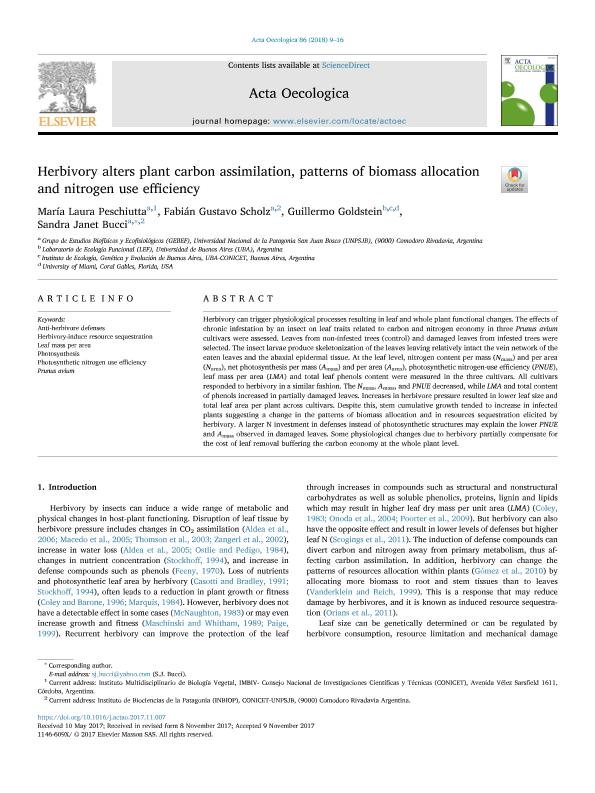Artículo
Herbivory alters plant carbon assimilation, patterns of biomass allocation and nitrogen use efficiency
Peschiutta, María Laura ; Scholz, Fabian Gustavo
; Scholz, Fabian Gustavo ; Goldstein, Guillermo Hernan
; Goldstein, Guillermo Hernan ; Bucci, Sandra Janet
; Bucci, Sandra Janet
 ; Scholz, Fabian Gustavo
; Scholz, Fabian Gustavo ; Goldstein, Guillermo Hernan
; Goldstein, Guillermo Hernan ; Bucci, Sandra Janet
; Bucci, Sandra Janet
Fecha de publicación:
01/2018
Editorial:
Elsevier Masson
Revista:
Acta Oecologica
ISSN:
1146-609X
Idioma:
Inglés
Tipo de recurso:
Artículo publicado
Clasificación temática:
Resumen
Herbivory can trigger physiological processes resulting in leaf and whole plant functional changes. The effects of chronic infestation by an insect on leaf traits related to carbon and nitrogen economy in three Prunus avium cultivars were assessed. Leaves from non-infested trees (control) and damaged leaves from infested trees were selected. The insect larvae produce skeletonization of the leaves leaving relatively intact the vein network of the eaten leaves and the abaxial epidermal tissue. At the leaf level, nitrogen content per mass (Nmass) and per area (Narea), net photosynthesis per mass (Amass) and per area (Aarea), photosynthetic nitrogen-use efficiency (PNUE), leaf mass per area (LMA) and total leaf phenols content were measured in the three cultivars. All cultivars responded to herbivory in a similar fashion. The Nmass, Amass, and PNUE decreased, while LMA and total content of phenols increased in partially damaged leaves. Increases in herbivore pressure resulted in lower leaf size and total leaf area per plant across cultivars. Despite this, stem cumulative growth tended to increase in infected plants suggesting a change in the patterns of biomass allocation and in resources sequestration elicited by herbivory. A larger N investment in defenses instead of photosynthetic structures may explain the lower PNUE and Amass observed in damaged leaves. Some physiological changes due to herbivory partially compensate for the cost of leaf removal buffering the carbon economy at the whole plant level.
Archivos asociados
Licencia
Identificadores
Colecciones
Articulos(IMBIV)
Articulos de INST.MULTIDISCIPL.DE BIOLOGIA VEGETAL (P)
Articulos de INST.MULTIDISCIPL.DE BIOLOGIA VEGETAL (P)
Articulos(INBIOP)
Articulos de INSTITUTO DE BIOCIENCIAS DE LA PATAGONIA
Articulos de INSTITUTO DE BIOCIENCIAS DE LA PATAGONIA
Citación
Peschiutta, María Laura; Scholz, Fabian Gustavo; Goldstein, Guillermo Hernan; Bucci, Sandra Janet; Herbivory alters plant carbon assimilation, patterns of biomass allocation and nitrogen use efficiency; Elsevier Masson; Acta Oecologica; 86; 1-2018; 9-16
Compartir
Altmétricas



